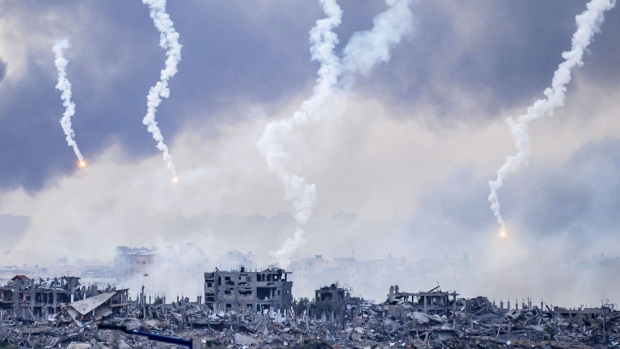The first captives held by the Palestinian militant group Hamas are set to be released on Friday afternoon as part of a prisoner exchange, as a four-day cease-fire deal with Israel came into effect at 7 a.m. local time (6 a.m. CET), according to Politico.
The BBC reported that what appeared to be Israeli strikes on Gaza could still sporadically be heard until around 7:15 a.m., but that the truce held thereafter.
The cease-fire will also allow aid to enter Gaza. The first fuel trucks entered the enclave from the Rafah border crossing with Egypt shortly after the pause in fighting began, local media reported.
On Thursday evening, a spokesperson for the Qatari foreign ministry — which acted as an intermediary to help broker the cease-fire deal, together with the United States and Egypt — announced the first hostages would be released by Hamas at around 4 p.m. local time (3 p.m. CET) on Friday.
“They will be 13 in number, all women and children and those hostages from the same families will be put together within the same patch,” spokesperson Majed Al-Ansari said.
Under the deal, Israel is also set to release 150 Palestinians held in Israeli jails.
“Regarding the Palestinians, I can’t disclose right now information about how many of them will be freed tomorrow,” Al-Ansari said on Thursday. “The deal is a reciprocal deal so we’re expecting a release to happen also on the Israeli side.”
Israel besieged the Gaza Strip in retaliation for Hamas’ surprise attacks, which killed 1,200 people on Israeli soil on October 7 and also saw around 240 people taken by the Palestinian militant group. Israel has restricted access to food, water and fuel to the densely populated enclave, home to about 2 million people.
For the past seven weeks, Israeli forces have launched thousands of airstrikes and a ground offensive into northern Gaza, which have killed more than 13,300 people according to the Hamas-run health authorities.
The truce, which was agreed on Wednesday, could be extended by one extra day for every 10 hostages released by Hamas, Israel says. But Israel’s Prime Minister Benjamin Netanyahu has vowed to keep fighting after the cease-fire ends.
On Friday morning, Israel’s airforce dropped leaflets in Arabic over southern Gaza warning civilians that the “war has not ended yet” and that returning to the northern part of the enclave was “prohibited and very dangerous,” the Associated Press reported.


